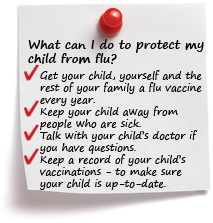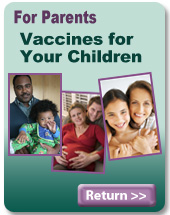Flu (Influenza) - Fact Sheet for Parents
Diseases and the Vaccines that Prevent Them
Español: Gripe (influenza)
Printer friendly version[429 KB, 2 pages]
Benefits of the flu vaccine
- Saves lives.
- Protects against serious disease.
- Protects against serious flu complications
- Helps protect others.
Side effects of the flu vaccine
The most common side effects are usually mild and include the following:
- Redness, swelling, and sore arm from the shot
- Fever, muscle aches
Side effects of the nasal spray flu vaccine
The most common side effects are usually mild and include:
- Runny, stuffy nose
- Fever, headache, muscle aches
- Cough or wheezing
- Stomach ache or diarrhea
What is the flu?
The flu—short for influenza—is an illness of the nose, throat, and lungs caused by influenza viruses. It spreads easily and can cause serious problems, especially for very young children, older people and people with certain long-term medical conditions like asthma and diabetes. The flu vaccine can protect against this disease.
What are the symptoms of flu?
Flu symptoms can include the following:
- Fever (not everyone with the flu has a fever)
- Chills
- Cough
- Sore throat
- Headache
- Muscle aches
- Tiredness
Some children with the flu will vomit or have diarrhea.
Symptoms start about 2 days after contact with the virus. Some people get better in a few days, others can be sick for weeks. People can spread the flu from one day before symptoms begin to 5-7 days after. This can be longer in children and people who are very sick.
How serious is the flu?
Flu illness can be mild or very serious. Flu seasons also vary in how serious they are from one year to another. Between 1976 and 2006, estimated deaths in the United States from the flu ranged from about 3,000 during the mildest season to 49,000 during the most severe season.
Complications from the flu include:
- Pneumonia (lung infection)
- Dehydration (loss of body fluids)
- Worsening of long-term medical conditions, like asthma and diabetes
People who get these complications often need care in the hospital. In the United States, each year an average of 20,000 children younger than 5 years old need hospital care because of flu complications. Children with long-term medical conditions, babies and children younger than 2 years old are more likely to end up in the hospital from flu.
 How does the flu spread?
How does the flu spread?
Flu spreads when infected people talk, cough or sneeze and droplets with virus in them land in the mouths or noses of people nearby. You may also get the flu by touching an object with flu virus on it—like a doorknob or used tissue—and then touching your own eyes, nose, or mouth.
People who have the flu should stay home (except to seek medical care) until 24 hours after their fever is gone without the use of fever-reducing medicine.
What is the flu vaccine?
The flu vaccine is something you get to help protect against the flu. There are two kinds of flu vaccines: the shot, given with a needle, usually in the arm, and the nasal spray.
How often should I get a vaccine?
Everyone 6 months and older should get a flu vaccine every year.
This is because each year, a new vaccine is made to protect against the latest flu viruses. Also, the protection from a vaccine wears off after time so you need a new vaccine to renew your protection. A flu vaccine will protect you all season.
Which flu vaccine should my child get?
Children without medical problems and no history of wheezing who are 2 years and older can get the nasal spray vaccine. Children 6 months to 2 years, children who have experienced wheezing in the past year, and children with long-term medical conditions (which includes asthma) should get the flu shot instead. Neither vaccine can cause the flu because the viruses are killed or weakened.
Babies younger than 6 months are too young to get either vaccine but they can be protected if their mother is vaccinated during pregnancy, and if everyone around them gets the flu vaccine.
When should my child get the flu vaccine?
Everyone should get the flu vaccine as soon as it is available each year. The body takes about 2 weeks to build protection against the flu after getting the vaccine, and protection lasts throughout the flu season.
Some children 6 months through 8 years of age may need two doses of the vaccine to be fully protected. Ask your child’s doctor how many doses they need. The flu vaccine can be given at the same time as other childhood vaccines.
Why should my child get the flu vaccine?
Even healthy children can get flu and spread it to others.
Getting your child the flu vaccine is the most important thing you can do to protect them from the flu and its possible complications. It can also help protect others, including babies younger than 6 months who are too young to get the vaccine.
Is the flu vaccine safe?
Yes, flu vaccines are safe. Hundreds of millions of Americans have safely received seasonal flu vaccines. Vaccines, like any medicine, can have side effects. Most people who get the flu vaccine have no side effects. Those that do occur are almost always mild, like a sore arm where the shot was given or a fever. Serious side effects are very rare.
If my child does not get the flu vaccine, will he get the flu?
Without the flu vaccine, your child is more likely to get the flu. In fact, children are the most likely age group to get the flu.
Among children younger than 5 years old, flu is a common cause for doctor visits and trips to urgent care centers.
Where can I learn more about the flu vaccine?
To learn more about the flu vaccine or other vaccines, talk to your child’s doctor.
Call 800-CDC-INFO (800-232-4636) or go to the CDC Vaccines web site and check out the following resources:
Fact Sheets for Parents
Diseases and the Vaccines that Prevent Them
![]() This symbol means you are leaving the CDC.gov Web site. For more information, please see CDC's Exit Notification and Disclaimer policy.
This symbol means you are leaving the CDC.gov Web site. For more information, please see CDC's Exit Notification and Disclaimer policy.
Copyrighted images: Images on this website which are copyrighted were used with permission of the copyright holder and are not in the public domain. CDC has licensed these images for use in the materials provided on this website, and the materials in the form presented on this website may be used without seeking further permission. Any other use of copyrighted images requires permission from the copyright holder.
Contact Us:
- Centers for Disease Control and Prevention
1600 Clifton Rd
Atlanta, GA 30333 - 800-CDC-INFO
(800-232-4636)
TTY: (888) 232-6348 - New Hours of Operation
8am-8pm ET/Monday-Friday
Closed Holidays - cdcinfo@cdc.gov




